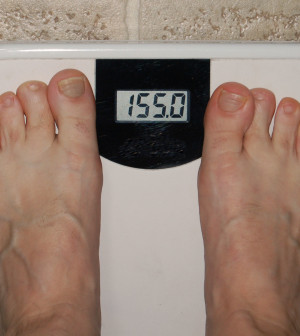- Could Your Grocery Store Meat Be Causing Recurring UTIs?
- Are You Making This Expensive Thermostat Error This Winter?
- Recognizing the Signs of Hypothyroidism
- 10 Strategies to Overcome Insomnia
- Could Artificial Sweeteners Be Aging the Brain Faster?
- Techniques for Soothing Your Nervous System
- Does the Water in Your House Smell Funny? Here’s Why
- Can a Daily Dose of Apple Cider Vinegar Actually Aid Weight Loss?
- 6 Health Beverages That Can Actually Spike Your Blood Sugar
- Treatment Options for Social Anxiety Disorder
Vitamins May Help Prevent Eye Problems After Weight-Loss Surgery, Study Finds


Weight-loss surgery patients who don’t take prescribed vitamin and mineral supplements could put themselves at risk for vision problems, a new study says.
Digestive system changes caused by the surgery can reduce nutrient absorption from food, the researchers explain in the current issue of the journal Obesity Surgery.
“There is a risk that bariatric surgery patients, who do not take the vitamin and mineral supplements prescribed to them, could develop eye-related complications because of nutrient deficiencies,” study co-author Rui Azevedo Guerreiro, of the Lisbon Hospital Central in Portugal, said in a journal news release.
“Such complications after bariatric surgery are not frequent, but if undetected, they can have devastating consequences for the patients,” the researcher added.
The study authors reviewed the available research and found that nutrient deficiencies after weight-loss surgery can lead to a wide range of eye conditions. They include night blindness, ulcers, scarring of and changes to the cornea, involuntary eye movement, paralysis of the eye muscles and dry eyes.
A lower intake of vitamins A, E and B1 (thiamine) and copper are especially concerning because they help with the normal functioning of the eye and optic system, the researchers said.
They found that vitamin A deficiency was most strongly linked to eye problems after weight-loss surgery.
“The real prevalence of these complications is unknown but the rarity of clinical reports that link nutrient deficiency with eye-related complications could also mean that no one is looking for such problems,” said co-author Rui Ribeiro in the news release.
More information
The U.S. National Institute of Diabetes and Digestive and Kidney Diseases has more about weight-loss surgery.
Source: HealthDay
Copyright © 2026 HealthDay. All rights reserved.










